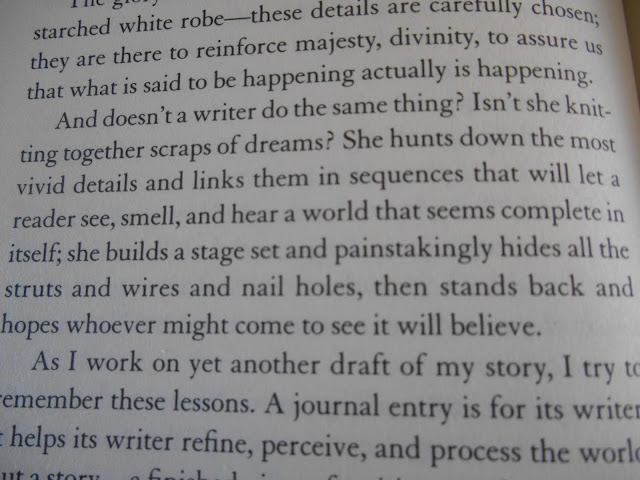Anthony Doerr did, as part of a year-long artist fellowship he won. He, his wife and six month old twin boys traveled from their home in Idaho to an unknown apartment in an unknown city in an unknown culture speaking an unknown language (except the four hour crash course in Italian he took on a Saturday morning before they left). The journal he kept during that year became this book, Four Seasons in Rome.
"A good journal entry - like a good song, or sketch, or photograph - ought to break up the film that forms over the eye, the finger, the tongue, the heart. A good journal entry ought to be a love letter to the world."The stories of their walk through the four seasons there, a few blocks from the Vatican, is subtitled, On Twins, Insomnia, and the Biggest Funeral in the World. Beyond recording the events, the adjustments, and the challenges, the book, for me, is a lesson in How-to-Journal.
The five senses are recorded throughout - a means he uses to process his memories, and a vibrant way for the reader to be involved in the scenes he records. Sights, smells, tastes, touch, and sounds - all carefully, thoughtfully woven through his words. Standing shoulder to shoulder with mourners as the pope dies, and later, pushing their double stroller through the crowd of celebrants as the new pope is chosen. Describing to a baker, the rich bread smells around them, the focaccia bread he wants to order, misunderstanding the frustration, realizing later he was asking, in his broken Italian, for grapefruit sauce. Discovering new foods, making new friends, listening to the language, learning to understand it. Hunting down those vivid details, linking them together to build a sequence of thought, to "stay alert to the miracles of the world."
"A journal entry is for its writer; it helps its writer refine, perceive, and process the world."
"A year is an infinity of perceptions: not just the shapes of starlings and the death of the pope and watching our sons learn to walk, but the smell of roasting meat in an alley, the dark brown eyes of a beggar on a church step, a single dandelion seed settling soundlessly onto the habit of a nun who is riding the train. This year has been composed of a trillion such moments; they flood the memory, spill over the edge of journal entries. What is it physicists tell us? Even in a finite volume, there are an infinite number of points."
In a way, this is discouraging. An infinite number of points? How could I ever catch them all? But that's not the point. Grab one. Grab two. Catch three. Record those vivid details, link together the sentences that help a reader (and me, the writer!) to see, smell, touch, taste and hear a world of beauty and miracles.
Anthony Doerr quotes Marilynne Robinson,
"There are a thousand thousand reasons to live this life, every one of them sufficient."
I think of Mary Oliver's poem,
"PAY ATTENTIONKeeping a journal has been important to me for years. I have a box of old journals stashed in a closet. Never for publication, but for me to thumb back through if I am looking for notes, or find when something happened, or just for browsing. This book, Four Seasons in Rome, is not only an interesting read of their year as a family, as an artist, as an author, as part of a community, but also of the way he perceived and responded to the world around him, brilliant at capturing those images, and how he stayed alert to the miracles of the world. Now, when I write in my journal, I pay attention - not just recording feelings (as in emotions), but capturing a moment in time, using the senses as a means of paying attention, and searching for the right words.
BE ASTONISHED
TELL ABOUT IT."
I tried to find a good example of how he incorporates the senses in his sentences. It is an overall impression he leaves. I would call his journals, Impressionistic Journaling. Like the impressionist painters that paint in various dots and smudges and blends of color, but leave a distinct image on the canvas, he paints images with his words that leave a distinct image. Powerful, beautiful writing.
"Everything is radiant. Distant trees toss, faraway walls gleam. The mountains at the horizon have switched on like streetlights, stark and defined, giving way to more distant ranges.
Then everything goes dark again, the clouds knitted together, the mountains sucked back into silhouette, Rome sinking into shadow."





























